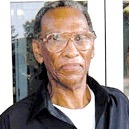 Robert Carroll Coney In March 1962, an armed man robbed a grocery store in Lufkin, Texas, taking over $2,000. Witnesses identified 33-year-old Robert Carroll Coney and Henry Cooper as the men involved in the robbery.
Both men were arrested and interrogated by Angelina County Sheriff’s deputies. Coney initially claimed that he was only giving Cooper a ride, and that he had nothing to do with the robbery. But the police threatened to beat and shoot him, and slammed his fingers in a jail cell door so hard that he required immediate surgery to avoid amputation. Coney eventually confessed. He was not provided an attorney until the morning that he pled guilty on March 16, 1966. He was sentenced to life in prison.
In May, Coney escaped from prison, but was recaptured two months later. Over the next 37 years, he was moved between prisons in Mississippi and Louisiana to serve time for other charges, including counterfeiting checks and an assault.
During that period, he escaped and was recaptured several more times.
In 1973, while in Louisiana, Coney filed a state law writ of habeas corpus seeking dismissal of the 1966 Texas robbery charges, and in September 1973, a district court judge in Texas granted the writ and vacated the remainder of Coney’s sentence. However, Coney was never notified that the writ had been approved, and the order was never carried out.
In March 2003, after finishing a sentence for a 1983 assault charge in Mississippi, Coney was transferred back to Texas to serve his remaining sentence on the robbery charge. He filed another habeas corpus petition in October 2003, prompting State District Court Judge David V. Wilson to investigate. The judge found that in the 1960s, the Angelina County Sheriff’s department was known for beating confessions out of prisoners, and that closing cell doors on inmates’ fingers had been common practice. Coney’s attorney in the robbery trial confirmed that it was not unusual for attorneys to be assigned only when a defendant was in front of a judge. Based on this information, the district judge recommended that Coney’s robbery conviction be vacated. The Texas Court of Criminal Appeals agreed and granted the writ in June 2004. Coney was freed on August 10, 2004 at the age of 74, but was arrested again in December 2004 for a prior prison escape in Georgia. He was released on a medical reprieve a month later and, in June 2005, the state of Georgia commuted his sentence to time served.
- Stephanie Denzel
|